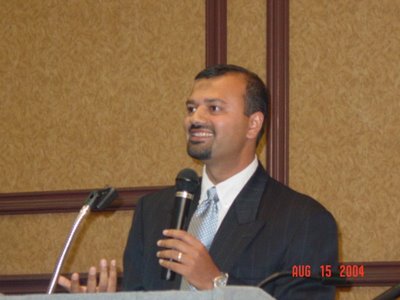Last Friday of Ramadan
Imagine a loved one coming to visit at your house for a little while. Before the arrival, there is much anticipation, a yearning for the days to go by fast until they arrive, preparation, etc. and the initial days are great, filled with talking, laughing, hanging out, etc. the middle period is a bit more awkward and thoughts begin to come into your head, although you don’t voice them, that when will this be over? And before you know it, it comes time for your friend to leave; you begin to wonder how quickly the time went by, how you could extend it a bit more, you know you have to, but you hate to say good bye, so you say “till next time”!!!
The month of Ramadan is that visitor, who comes but once a year, stays for a little while, and then departs; you hate to say good bye, so you settle with “till next time” not knowing, but praying that next year, you will be around for his visit;
So it is time for us, in this last Friday of the month of Ramadan to say farewell to this blessed visitor; it came with eager anticipation, filled our lives with blessings, and although we knew this day would come, we didn’t know it would come so soon!!! But this visitor is not leaving without a mark on our lives; because of its visit, Muslims got together and became closer; and this visitor is leaving some things behind for us to reflect upon, because it taught us a bit more about ourselves; most importantly being that we can do anything we set our minds to:
Following are some of the lessons that we learnt in Ramadan (borrowed from Dr. Muzammil Siddiqi):
1. Patience: Fasting in Ramadan taught us patience (sabr). It taught us self-discipline. Now we have to use this training. We avoided some permissible things during fasting, now we know how to control ourselves and protect ourselves from unlawful (Haram) things.
2. Control over passions and desires: Fasting taught us to control our passions and desires. Now we have to use this training and keep ourselves always pure. We must not be the slaves of our lusts and desires. We should not obey our desires, but we must obey Allah all the time.
3. Control over bad temper: Fasting taught us to control bad temper. It taught us how to avoid bad words. Now we have to use this training. We must not quarrel with others or use bad language. We should be a gentle and honorable people all the time.
4. Charity: Fasting taught us charity (muwasat). We paid our Zakat and our Sadaqat in this month. Now we know how to be good, kind and generous to those who are in need. Now we know how to help good causes always.
5. Nawafil: During Ramadan we prayed Tarawih during the night. Now we should be regular in our daily prayers. We should pray them on time and in a proper manner. We woke up for Sahur every night. Now we can get up for Tahajjud prayer. We should try to pray Tahajjud as much as possible.
6. Regular Visit to Masjid: During Ramadan we came to the Masjid every day. Now we should make a habit to pray at the Masjid as much as we can. We have our Friday which is known as the Sayyid al-Ayyam (the best day of the week). We should not neglect the Friday prayer. We should also take care of the Masjid. Those who come to the Masjid should be also those who maintain the Masjid.
7. Reading of the Qur’an: During Ramadan we read the Qur’an and we listened to the Qur’an. Now we should make a resolution to read the Qur’an every day. We should read one juz’ or half Juz’ every day. We should read with translation and try to reflect on the Words of Allah.
8. Family gathering: During Ramadan we spent more time with our families. We ate together and we prayed together. Now we should keep this habit. The families that eat together and pray together stay together. We should have good relations with our spouses. We should pay more attention to our children and our youth. We should give them more time and continue to help them to learn the principles and values of Islam. We must pay attention to their Islamic education and training.
9. Concern for the Ummah: During Ramadan we prayed to Allah to help the Muslims of Palestine, Chechnya, Muslims of Kashmir, Muslims of Iraq, Muslims of Afghanistan and Muslims who are suffering in many other lands. We should continue to know more about them and do whatever we can to relieve their suffering and to help bring justice and peace in the world.
10. More good deeds: During Ramadan we did a lot of good things. Now we should be in the habit of doing good all the time.
The purpose of ‘Ibadah (our acts of worship) is to make us Allah’s servants. Allah’s servants are the best human beings. Our challenge is to become the best human beings that we are supposed to be.
Labels: friday, islam, khutba, last, Monem Salam, Muhammed, muslim, Ramadan

